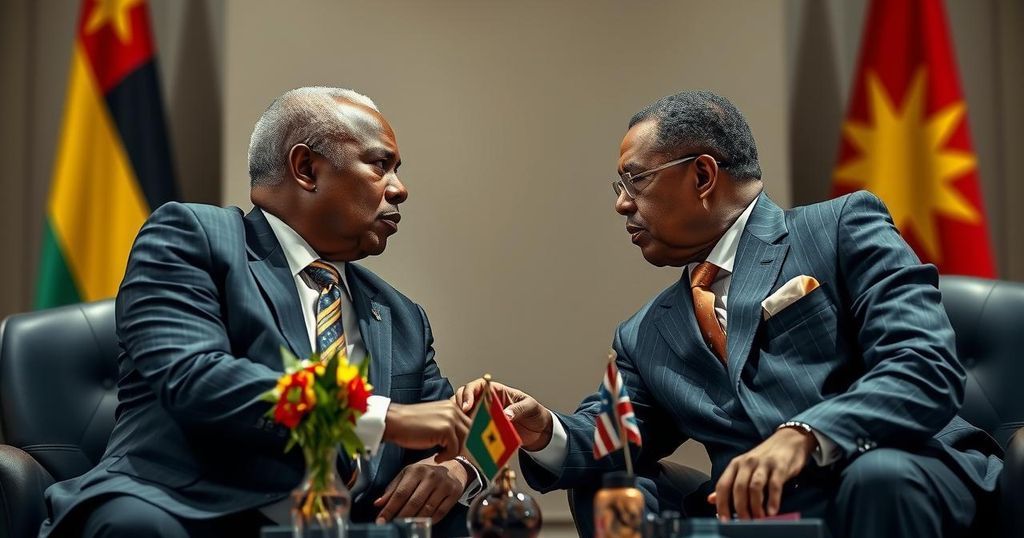Mnangagwa Engages Botswana’s New President Boko Amid Diplomatic Recalibration

Zimbabwe’s President Emmerson Mnangagwa met with Botswana’s new leader Duma Boko to rebuild diplomatic relations after Botswana’s recent electoral shift. This meeting aims to enhance cooperation in trade, security, and economic partnerships, amidst growing opposition challenges to liberation movements in the region.
In a significant diplomatic development, Zimbabwean President Emmerson Mnangagwa convened with Botswana’s newly elected leader, Duma Boko, during the World Children’s Day celebrations in Victoria Falls. This encounter aims to mend the strained relations that ensued following the unexpected electoral defeat of Mnangagwa’s ally, former President Mokgweetsi Masisi. Boko’s ascendance to power, representing the Umbrella for Democratic Change (UDC), has disrupted the political status quo in Botswana, a nation where the Botswana Democratic Party had dominated for nearly six decades. Mnangagwa’s delay in congratulating Boko after his victory highlighted the concerns surrounding the new political landscape in Southern Africa. An insider from the meeting articulated the necessity of establishing trust and cooperation between the two nations, especially to avoid missteps that characterized Mnangagwa’s previous interactions with Zambia’s President Hakainde Hichilema. Key topics of their discussions included enhancing trade relations, improving border management, collaboration on security, and establishing economic partnerships favoring both countries. Boko’s ascent is emblematic of the growing opposition presence throughout the Southern African region, posing challenges for traditional ruling parties such as Zimbabwe’s ZANU-PF and South Africa’s ANC. At Boko’s inauguration, the reception of opposition figures, in contrast to the jeering directed at Mnangagwa and Masisi, reflects shifting sentiments among the electorate. This trend underscores a vulnerability affecting liberation movements and raises the stakes for leaders like Mnangagwa in preserving their influence and governance. Learning from past diplomatic errors involving Zambia, Mnangagwa’s proactive approach with Botswana illustrates a crucial moment in Southern Africa’s political evolution. As both leaders prioritize shared interests despite their political differences, the outcome of their dialogue could dictate future regional dynamics. The willingness to overlook ideological divides in favor of national cooperation is pivotal for maintaining stability and fostering economic growth amidst changing political tides. This engagement also emphasizes Mnangagwa’s acute awareness of the changing political landscape while striving to preserve Zimbabwe’s strategic alliances in light of both domestic and international challenges. Their meeting represents a pragmatic step towards ensuring that Southern Africa can navigate its increasingly intricate political terrain with cooperation and mutual respect.
The diplomatic relationship between Zimbabwe and Botswana has historically been influenced by the political climates within each country. The recent electoral victory of Duma Boko from the Umbrella for Democratic Change (UDC) represents a significant shift as it unseated the long-ruling Botswana Democratic Party. This change has provoked concerns among neighboring nations, particularly Zimbabwe, where ruling party leaders have previously enjoyed stable affiliations with Botswana’s past leadership, making this engagement pivotal for future relations.
In conclusion, the meeting between Presidents Mnangagwa and Boko signifies a crucial effort to rejuvenate diplomatic ties following a significant political upheaval in Botswana. Their discussions focused on practical issues like trade and security, showcasing a commitment to collaboration despite political differences. As Southern Africa continues to evolve politically, this engagement may serve as a model for how leaders can navigate ideological divides in pursuit of national and regional stability.
Original Source: www.thezimbabwemail.com







